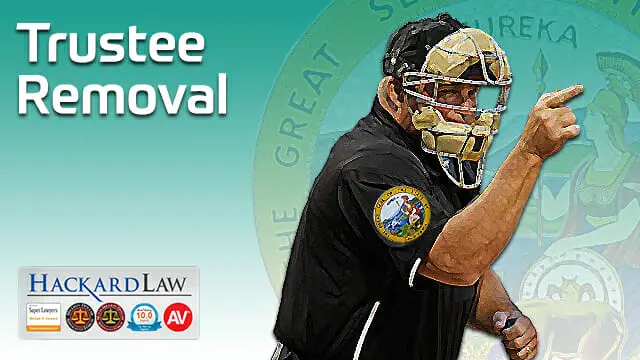
Problem Trustee Removal | Damages and Forcing Inheritance Distribution
Hackard Law, a California law firm representing clients in trust, estate and probate litigation, is regularly called upon to enforce a wronged beneficiary’s right to an accounting from an uncommunicative, recalcitrant or duplicitous trustee. While California probate courts will follow the law and order a trustee to provide an accounting, this is only part of what is often necessary to safeguard the beneficiary’s trust interests and to prevent further harm to an innocent beneficiary.
Trustee actions leading to the necessity of filing a petition for a court-ordered accounting often include the trustee’s refusal to make trust distributions. Waiting on an inheritance is a continual source of frustration to estate and trust heirs or beneficiaries. Trustee inaction may stem from sheer incompetence, inexperience, poor counsel, mismanagement, laziness, or the simple desire to be in control and stay in control. Whether the reasons for the failure to distribute the inheritance are wrongful, negligent or innocent, the delay must be addressed.
Engaging a law firm like Hackard Law will begin a process of document review (the will, revocable or irrevocable trust, insurance and IRA beneficiary designations), the preparation of timelines and a list of interested parties. All of this helps to focus on the reasons for the trustee’s failure to do his or her job.
An important part of dealing with a problem trustee is to understand that in California, the trustee is given a great deal of power. Statutory rules governing trustee authority and power are uniform statewide, with there being slight variations as to local rules of court. Local rules must be reviewed and understood when it comes to challenging a trustee’s actions, as the local probate rules in San Francisco will be different than those of San Diego, Los Angeles or Sacramento.
A trustee’s job is to marshal or collect assets, communicate with creditors, and distribute assets or income to beneficiaries in accord with trust terms. It is not at all unusual that a trustee favors himself or someone else as a beneficiary, attempts to sell trust assets to a favored person at a discount, or freezes some beneficiaries out of income, principal and information.
There is often sufficient information to support the suspension or removal of a trustee. Courts will move to protect beneficiaries and do not take the responsibility lightly. Due diligence required before filing a petition to remove a trustee includes a thorough review of the trust. Of course, sometimes this is not possible, since part of the trustee wrongdoing or misdeeds may be the failure to provide a beneficiary or heir with a copy of the trust.
Hackard Law regularly represents wronged beneficiaries who need to solution to a trustee’s silence coupled with inaction. The ultimate public policy behind California’s trustee laws is the preservation of the trust property. California Probate Code Section 15642 delineates some of the reasons supporting removal and provides in part:
“(a) A trustee may be removed in accordance with the trust instrument, by the court on its own motion, or on petition of a settlor, cotrustee, or beneficiary under Section 17200.
(b) The grounds for removal of a trustee by the court include the following:
(1) Where the trustee has committed a breach of the trust.
(2) Where the trustee is insolvent or otherwise unfit to administer the trust.
(3) Where hostility or lack of cooperation among cotrustees impairs the administration of the trust.
(4) Where the trustee fails or declines to act.
(5) Where the trustee’s compensation is excessive under the circumstances.”
Trust, probate and estate litigators will often seek an early suspension of the existing trustee’s powers and the appointment of a temporary trustee. These early actions are often done on an expedited or “ex parte” basis to preserve the trust, while allegations of wrongdoing can be proven or disproven at a later hearing. While these early suspension efforts are paid for by the challenging beneficiaries, such challenges usually include a request that the probate court judge not use trust assets to pay legal counsel for the defense. This can be a major point of contention.
If you are a wronged heir or an abused trust beneficiary and your inheritance has been delayed or denied, call us at Hackard Law at 916-313-3030. We are happy to discuss the elements that may support legal intervention to protect your rights.

 (916) 775-8542
(916) 775-8542